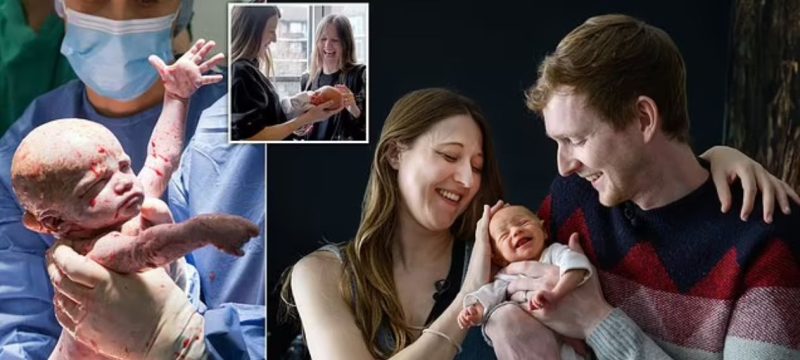In a groundbreaking achievement in the UK, Grace Davidson, 36, gave birth to a healthy baby girl after receiving a womb transplant from her sister, Amy Purdie. Grace, who was born with Mayer-Rokitansky-Küster-Hauser (MRKH) syndrome, a rare condition that left her without a functioning uterus, underwent a successful 17-hour transplant operation in 2023 at Churchill Hospital in Oxford.
In February 2024, just over a year later, Grace delivered a baby girl named Amy Isabel via caesarean section at Queen Charlotte’s and Chelsea Hospital in London. The name honors both her sister, the organ donor, and transplant surgeon Isabel Quiroga, who led the medical team.
Read more: Chinese Surgeons Successfully Conduct First Liver Transplant Using Genetically Modified Pig Organ
Grace and her husband, Angus Davidson, 37, had stored embryos before the transplant and became pregnant on their first attempt with IVF. The transplant and birth were part of a clinical trial run by Womb Transplant UK, which has approval for 15 womb transplants from living and deceased donors. Medical staff volunteered their time, and the charity covered NHS-related expenses.
Professor Richard Smith, who oversees the trial, expressed immense joy, noting that the birth is the result of 25 years of research. Since Grace’s transplant, three more womb transplants using deceased donors have been performed in the UK. Surgeons hope this success will provide more women, especially those without functioning wombs, with the possibility of motherhood.
An estimated 15,000 women of childbearing age in the UK are affected by conditions preventing them from carrying children, with around 5,000 born without a womb. Amy Purdie, the donor, expressed no regrets, while Grace emphasized how the experience strengthened their bond. Grace is currently taking immunosuppressants to prevent rejection of the donated womb and hopes to have one more child before undergoing a hysterectomy, after which the risks from the medication will decrease.
Globally, more than 135 womb transplants have been performed, resulting in at least 65 births. The first successful transplant took place in Sweden in 2014. Grace’s story now serves as a symbol of hope for women facing similar reproductive challenges, both in the UK and worldwide.









